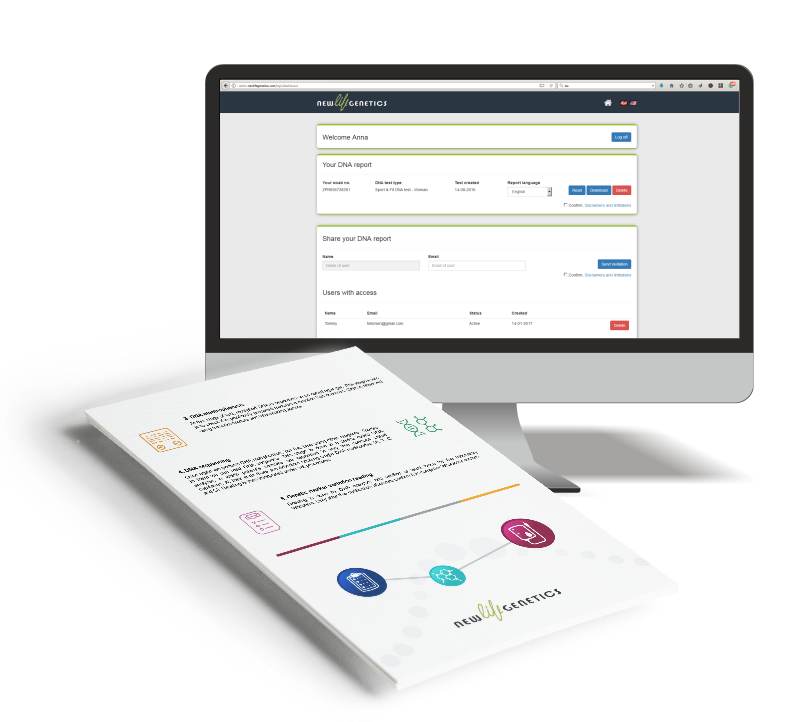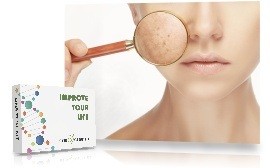DNA Stress Test

The latest scientific and technological developments in genetic STRESS testing.
Discover how predispositions to stress can affect your health.
Reveal how your genotype can influence your success.
Learn how our DNA test can help you to reduce stress.
Genetic Stress testing
Historically, stress would arise from physical dangers such as a nearby predator, and the body’s physiological stress response would typically provide adrenalin to aid our chances of survival through the ‘fight or flight’ response. In modern society, however, stressors – factors that cause stress – are all around us and can be anything that causes an individual to feel stress, e.g. work deadlines, unpaid bills, noisy neighbours etc. Although it can help us to realise the significance of a situation and potentially motivate us to cope, exposure to too much stress can have a negative impact on both mental and physical health. Short time symptoms can be insomnia, headache, back pain and nausea, with long-term can be cardiovascular disease, hair loss and infertility. It has been shown that an individual’s genes can influence their regulation of the stress hormone cortisol, their reactivity to stressors, and even their perception of the world around them.
In Stress DNA Test, we examine your DNA and identify your genetic variants of the genes associated with resistance to stress and coping with stress by marking variants of specific genes. Once this has been revealed, personalised information can be provided based on your genotype. That may help you to control stress and have more relaxed and healthier lifestyle.


Through completion of the STRESS DNA test, you will learn, amongst other things:
- Whether your variant of the COMT gene classifies you as a ‘sensitive explorer’, present in 27% of the population and is linked with increased creativity, higher emotional reactivity, and a raised susceptibility to turn to unhealthy substances as a coping mechanism.
- You are one of the 46% who carries the ‘warrior’ variant of the COMT gene. The “warrior” variant often associates with reduced sensitivity to situations with others may find stressful, and a greater tendency to seek new experiences and knowledge.
- Whether you carry the variation AG of the COMT gene – which includes attributes from both the above-mentioned variants, and what this means for the genetic predispositions to mental and physical traits.
- How your genetic variant of the neurotransmitter serotonin can affect your emotional state, and how dietary intervention can provide beneficial support.
- How your genotype impacts social interaction with others, and whether you have introvert or extrovert tendencies within your genes. Reveal your genetic predisposition to oxytocin – a hormone and neurotransmitter which has been shown to affect several elements of human personality, including cooperation, relationships, and trust.
- How your susceptibility to stressors can affect the physical health of your body, and how you can improve your diet by including or excluding certain foods, depending on your genotype.
- The importance of the brain-derived neurotrophic factor (BDNF) in the development of nerve cells, and how your genetic variant affects motor skills, such as spatial orientation etc. Levels of BDNF can impact parts of everyday life, such as driving a car and participating in team sports.
- Whether your genetic variant of the glucocorticoid receptors affects levels of the cortisol – also known as the ‘stress hormone’. Discover how your predisposition affects your susceptibility to stress and mood disorders through cortisol activity, and how you can improve resistance to stress using simple diet and lifestyle alterations
Among specific guidelines formulated by your DNA test result, you will find, among others, recommendations such as:
- Which type of activities will encourage stress according to your genotype.
- How to reduce the impact of stress by making simple lifestyle adjustments.
- Which profession is more suited to your genetic dispositions associated with stress response.
- How to ensure environments at work and home remain as stress-free as possible.
DNA Stress test
recommended for
Please note:
None of our DNA tests deal with inherited life-threatening diseases such as risks of various cancers, Alzheimer’s, etc. We focus our tests only on areas where we, with proper counselling could change our lives in different positive areas and thereby hopefully achieve a stronger, longer and more quality-filled life.
Genetic Stress testing
Historically, stress would arise from physical dangers such as a nearby predator, and the body’s physiological stress response would typically provide adrenalin to aid our chances of survival through the ‘fight or flight’ response. In modern society, however, stressors – factors that cause stress – are all around us and can be anything that causes an individual to feel stress, e.g. work deadlines, unpaid bills, noisy neighbours etc. Although it can help us to realise the significance of a situation and potentially motivate us to cope, exposure to too much stress can have a negative impact on both mental and physical health. Short time symptoms can be insomnia, headache, back pain and nausea, and long-term can be cardiovascular disease, hair loss and infertility. It has been shown that an individual’s genes can influence their regulation of the stress hormone cortisol, their reactivity to stressors, and even their perception of the world around them.
In Stress DNA Test, we examine your DNA and identify your genetic variants of the genes associated with resistance to stress and coping with stress by marking variants of specific genes. Once this has been revealed, personalised information can be provided based on your genotype. That may help you to control stress and have more relaxed and healthier lifestyle.

Through completion of the STRESS DNA test, you will learn, amongst other things:
- Whether your variant of the COMT gene classifies you as a ‘sensitive explorer’, present in 27% of the population and is linked with increased creativity, higher emotional reactivity, and a raised susceptibility to turn to unhealthy substances as a coping mechanism.
- You are one of the 46% who carries the ‘warrior’ variant of the COMT gene. The “warrior” variant often associates with reduced sensitivity to situations with others may find stressful, and a greater tendency to seek new experiences and knowledge.
- Whether you carry the variation AG of the COMT gene – which includes attributes from both the above-mentioned variants, and what this means for the genetic predispositions to mental and physical traits.
- How your genetic variant of the neurotransmitter serotonin can affect your emotional state, and how dietary intervention can provide beneficial support.
- How your genotype impacts social interaction with others, and whether you have introvert or extrovert tendencies within your genes. Reveal your genetic predisposition to oxytocin – a hormone and neurotransmitter which has been shown to affect several elements of human personality, including cooperation, relationships, and trust.
- How your susceptibility to stressors can affect the physical health of your body, and how you can improve your diet by including or excluding certain foods, depending on your genotype.
- The importance of the brain-derived neurotrophic factor (BDNF) in the development of nerve cells, and how your genetic variant affects motor skills, such as spatial orientation etc. Levels of BDNF can impact parts of everyday life, such as driving a car and participating in team sports.
- Whether your genetic variant of the glucocorticoid receptors affects levels of the cortisol – also known as the ‘stress hormone’. Discover how your predisposition affects your susceptibility to stress and mood disorders through cortisol activity, and how you can improve resistance to stress using simple diet and lifestyle alterations
Among specific guidelines formulated by your DNA test result, you will find, among others, recommendations such as:
- Which type of activities will encourage stress according to your genotype.
- How to reduce the impact of stress by making simple lifestyle adjustments.
- Which profession is more suited to your genetic dispositions associated with stress response.
- How to ensure environments at work and home remain as stress-free as possible.

DNA Stress test
recommended for
Please note:
None of our DNA tests deal with inherited life-threatening diseases such as risks of various cancers, Alzheimer’s, etc. We focus our tests only on areas where we, with proper counselling could change our lives in different positive areas and thereby hopefully achieve a stronger, longer and more quality-filled life.
Easy home DNA test kit
Our DNA test harnesses the latest technology and the non-invasive saliva swab test kit is 100% safe, easy to use, and takes no longer than five minutes. Once the saliva sample has been obtained, simply re-pack into our easy and prepaid return envelope and put it in the post box.
Personal DNA Stress test report
After our laboratory has completed your DNA Stress-test, you will receive an e-mail with a link directly to your personal DNA report, which will be password protected. Here you can read the report online, and you can also download the report as PDF to access at any time.
This Stress test report is typically between 12 and 15 pages, depending on the genotype.
This DNA test report is at present available in English and Danish.

Easy home DNA test kit
Our DNA test harnesses the latest technology and the non-invasive saliva swab test kit is 100% safe, easy to use, and takes no longer than five minutes. Once the saliva sample has been obtained, simply re-pack into our easy and prepaid return envelope and put it in the post box.
Personal DNA Stress test report
After our laboratory has completed your DNA Stress-test, you will receive an e-mail with a link directly to your personal DNA report, which will be password protected. Here you can read the report online, and you can also download the report as PDF to access at any time.
This Stress test report is typically between 12 and 15 pages, depending on the genotype.
This DNA test report is at present available in English and Danish.

Explore our other DNA-tests
Stress testing related tags: How to do a stresstest online. Genetic anxiety. Buy Stress testing online.
Stress testing related tags: How to do a stresstest online. Genetic anxiety. Buy Stress testing online.


















